#DataScienceTraining
Text
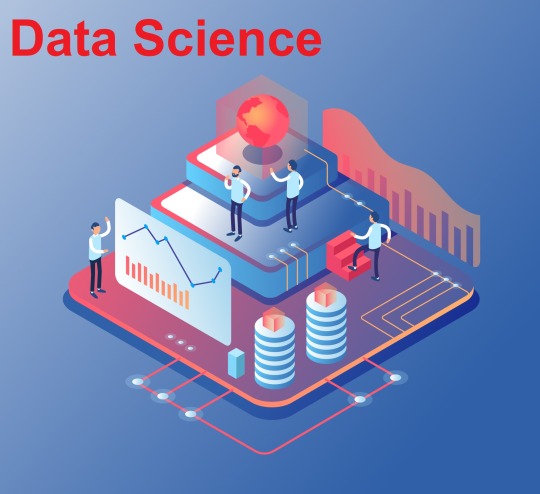
Our Data Science Training in Noida is designed by industry experts to cover the latest tools, techniques, and technologies used in data analysis, machine learning, and artificial intelligence. Whether you are a beginner or an experienced professional seeking to enhance your expertise, our courses cater to diverse skill levels and backgrounds.
#DataScienceTraining#NoidaTechEducation#DataScienceCourse#APTRONSolutions#CareerInDataScience#DataScienceJobs#LearnDataScience
0 notes
Text
Azure Data Engineering Course Hyderabad
Naresh i Technologies
✍Enroll Now: https://bit.ly/3QhLDqQ
👉Attend a Free Demo On Azure Data Engineering with Data Factory by Mr. Gareth.
📅Demo on: 1st May @ 9:00 PM (IST)

Azure Data Engineering with Azure Data Factory refers to the process of designing, developing, deploying, and managing data pipelines and workflows on the Microsoft Azure cloud platform using Azure Data Factory (ADF). Azure Data Factory is a cloud-based data integration service that allows users to create, schedule, and orchestrate data pipelines to ingest, transform, and load data from various sources into Azure data storage and analytics services.
Key components and features of Azure Data Engineering with Azure Data Factory include:
Data Integration: Azure Data Factory enables seamless integration of data from diverse sources such as relational databases, cloud storage, on-premises systems, and software as a service (SaaS) applications. It provides built-in connectors for popular data sources and destinations, as well as support for custom connectors.
ETL (Extract, Transform, Load): Data engineers can use Azure Data Factory to build ETL pipelines for extracting data from source systems, applying transformations to clean, enrich, or aggregate the data, and loading it into target data stores or analytics platforms. ADF supports both code-free visual authoring and code-based development using languages like Azure Data Factory Markup Language (ARM) templates or Python.
Data Orchestration: With Azure Data Factory, users can orchestrate complex data workflows that involve multiple tasks, dependencies, and conditional logic. They can define and schedule the execution of data pipelines, monitor their progress, and handle errors and retries to ensure reliable data processing.
Integration with Azure Services: Azure Data Factory integrates seamlessly with other Azure services such as Azure Synapse Analytics (formerly Azure SQL Data Warehouse), Azure Databricks, Azure HDInsight, Azure Data Lake Storage, Azure SQL Database, and more. This integration allows users to build end-to-end data solutions that encompass data ingestion, storage, processing, and analytics.
Scalability and Performance: Azure Data Factory is designed to scale dynamically to handle large volumes of data and high-throughput workloads. It leverages Azure's infrastructure and services to provide scalable and reliable data processing capabilities, ensuring optimal performance for data engineering tasks.
Monitoring and Management: Azure Data Factory offers monitoring and management capabilities through built-in dashboards, logs, and alerts. Users can track the execution of data pipelines, monitor data quality, troubleshoot issues, and optimize performance using diagnostic tools and telemetry data.
Naresh i Technologies
#Microsoftazure#azuredataengineer#microsoft#azure#azureadmin#Online#training#Course#education#learning#software#students#dataengineer#datascience#datascientist#dataengineering#dataanalytics#dataanalysis#devops#deeplearning#bigdataanalytics#datasciencetraining#nareshit
0 notes
Text
Understanding the Role of an AI Engineer
In the era of rapid technological advancements, the roles and responsibilities of professionals in the field of technology have evolved significantly. One such role that has gained prominence in recent years is that of an Artificial Intelligence (AI) Engineer. As businesses across various industries increasingly rely on data-driven insights to make informed decisions, the demand for skilled AI Engineers continues to soar. In this blog post, we will delve into the intricacies of the role of an AI Engineer, exploring their skills, responsibilities, and the importance of Data Science certification in preparing for this career path.
Understanding the Role of an AI Engineer:
Artificial Intelligence Engineers are tasked with developing, implementing, and maintaining AI solutions that enable machines to simulate human intelligence. This includes tasks such as natural language processing, machine learning, and computer vision. Their primary goal is to create algorithms and models that can analyze large datasets to extract valuable insights and drive business outcomes.
Key Skills Required:
To excel in the role of an AI Engineer, individuals need a strong foundation in mathematics, statistics, and programming. Proficiency in programming languages such as Python, R, and Java is essential for building AI applications. Additionally, a deep understanding of machine learning algorithms and data structures is crucial for developing robust AI solutions.
Role of Data Science:
Data Science Training plays a pivotal role in equipping aspiring AI Engineers with the necessary skills and knowledge to thrive in this field. Through comprehensive Data Science courses, individuals can gain expertise in data analysis, machine learning techniques, and programming languages. These training programs provide hands-on experience with real-world datasets, allowing students to apply theoretical concepts to practical scenarios.
Responsibilities of an AI Engineer:
AI Engineers are responsible for designing and implementing AI algorithms that can solve complex problems and automate tasks. They collaborate closely with data scientists and domain experts to understand business requirements and translate them into technical solutions. Additionally, AI Engineers are involved in testing and optimizing AI models to ensure accuracy and efficiency.
Career Opportunities:
The demand for AI Engineers is steadily increasing across industries such as healthcare, finance, retail, and manufacturing. With the exponential growth of data, organizations are seeking professionals who can harness the power of AI to gain a competitive edge. AI Engineers have diverse career opportunities, ranging from roles in research and development to consulting and entrepreneurship.
Ethical Considerations:
Alongside technical skills, AI Engineers must also consider the ethical implications of their work. As AI systems become increasingly integrated into everyday life, issues such as bias, privacy, and accountability come to the forefront. AI Engineers play a vital role in ensuring that AI solutions are developed and deployed ethically, taking into account factors such as fairness, transparency, and accountability.
Continuous Learning:
The field of artificial intelligence is constantly evolving, with new algorithms, techniques, and technologies emerging regularly. Therefore, AI Engineers must commit to lifelong learning to stay updated with the latest advancements in the field. Engaging in continuous learning through online courses, workshops, and conferences enables AI Engineers to expand their knowledge and skills, keeping them at the forefront of innovation.
As technology continues to reshape the landscape of industries worldwide, the role of AI Engineers has become indispensable. These professionals play a crucial role in leveraging data to drive innovation and solve complex problems. Through Data Science Course Training, individuals can acquire the skills and expertise needed to embark on a rewarding career path as an AI Engineer. By staying abreast of the latest developments in AI and continuously honing their skills, AI Engineers can contribute to groundbreaking advancements in technology and shape the future of artificial intelligence.
0 notes
Text

Are you ready to embark on a journey into the realm of data science? Look no further than APTRON Gurgaon's top-notch Data Science Training Course in Gurgaon. Designed to equip you with the latest tools, techniques, and skills demanded by the industry, our course promises to be your gateway to a lucrative career in data science.
#DataScienceTraining#APTRONGurgaon#DataScienceCourse#LearnDataScience#GurgaonTraining#DataScienceSkills#DataAnalytics#CareerInDataScience#AIandMLTraining#TechEducation
0 notes
Text
Fixing the Top 10 Common Data Quality Problems
In the realm of Data Science Training, ensuring data quality is paramount. Poor data quality can lead to erroneous insights, flawed decisions, and ultimately, wasted resources. Recognizing and addressing common data quality issues is crucial for any organization aiming to leverage data effectively. Let's explore the ten most prevalent data quality issues and practical solutions to rectify them.
Inaccurate Data Entry:
One of the fundamental data quality issues is inaccurate data entry. Human error during data input can introduce inconsistencies and inaccuracies, undermining the reliability of the entire dataset. To mitigate this, organizations can implement validation checks and data entry controls to minimize errors. Additionally, providing comprehensive Data Science Training to personnel responsible for data entry can enhance accuracy and reduce mistakes.
Missing Values:
Missing values within datasets pose a significant challenge in data analysis. Whether due to oversight or incomplete records, these gaps can skew analytical results and compromise decision-making processes. Addressing missing values involves employing techniques such as imputation, where missing values are estimated based on existing data patterns. Furthermore, thorough data preprocessing steps during Data Science Training can equip practitioners with the skills to handle missing data effectively.
Duplicate Entries:
Duplicate entries occur when the same information is recorded multiple times within a dataset. This redundancy can distort analytical findings and inflate statistical measures. To tackle this issue, organizations can utilize algorithms or manual inspection to identify and remove duplicate entries. Implementing data deduplication processes as part of Data Science Course protocols ensures data integrity is maintained from the outset.
Inconsistent Formatting:
Inconsistencies in data formatting, such as variations in date formats or inconsistent units of measurement, hinder data analysis and interpretation. Standardizing data formats through normalization techniques facilitates seamless integration and enhances data quality. Data Science Training programs should emphasize the importance of adhering to standardized formatting conventions to streamline data processing and analysis workflows.
Bias and Incomplete Data:
Bias in datasets, whether inherent or introduced through sampling methods, can skew analytical outcomes and perpetuate misinformation. Moreover, incomplete data, where certain demographics or variables are underrepresented, can lead to erroneous conclusions. Mitigating bias and addressing incomplete data require careful consideration of sampling techniques and data collection methods. Data Science Training should equip practitioners with the knowledge and tools to identify and mitigate bias effectively, ensuring the integrity and representativeness of the data.
Data Integration Challenges:
In environments where data is sourced from disparate systems or sources, integrating diverse datasets presents a significant challenge. Incompatible data structures and schemas can impede the seamless merging of datasets, hindering data analysis efforts. Employing data integration tools and techniques, such as Extract, Transform, Load (ETL) processes, streamlines the integration process and promotes data consistency. Comprehensive Data Science Training should encompass instruction on data integration methodologies to enable practitioners to navigate complex data ecosystems effectively.
Poor Data Governance:
Lack of proper data governance frameworks can exacerbate data quality issues, leading to data misuse, unauthorized access, and security breaches. Establishing robust data governance practices, including data stewardship roles, access controls, and data quality monitoring mechanisms, is essential for maintaining data integrity and security. Data Science Course Training initiatives should emphasize the importance of adhering to data governance policies and procedures to safeguard sensitive information and uphold data quality standards.
Outdated Data:
Using outdated data for analysis can yield inaccurate insights and hinder decision-making processes. Data decay, where the relevance and accuracy of data diminish over time, necessitates regular data updates and refresh cycles. Implementing automated data refresh mechanisms and establishing data expiry dates ensures that analyses are based on the most recent and relevant information. Data Science Training should instill a culture of continuous data maintenance and update practices to prevent reliance on outdated information.
Data Security Concerns:
Data security breaches can compromise the confidentiality, integrity, and availability of data, leading to reputational damage and regulatory penalties. Safeguarding data through encryption, access controls, and regular security audits is imperative for protecting sensitive information from unauthorized access or malicious intent. Data Science Certification Training should include modules on data security best practices and compliance requirements to foster a security-conscious mindset among practitioners.
Lack of Data Quality Awareness:
A fundamental data quality issue is the lack of awareness among stakeholders regarding the importance of data quality and its impact on organizational outcomes. Cultivating a data-driven culture where stakeholders understand the significance of data quality promotes accountability and collaboration in maintaining data integrity. Incorporating data quality awareness sessions into Data Science Training programs fosters a shared understanding of data quality principles and encourages proactive data management practices.
Effective data quality management is essential for organizations striving to derive actionable insights and make informed decisions. By identifying and addressing common data quality issues, organizations can enhance the reliability, accuracy, and usability of their data assets. Through comprehensive Data Science Training Institute initiatives that emphasize data quality principles and best practices, practitioners can develop the skills and knowledge necessary to navigate the complexities of data management and analysis effectively. Ultimately, prioritizing data quality enables organizations to unlock the full potential of their data and drive innovation and growth in an increasingly data-driven world.
0 notes
Text
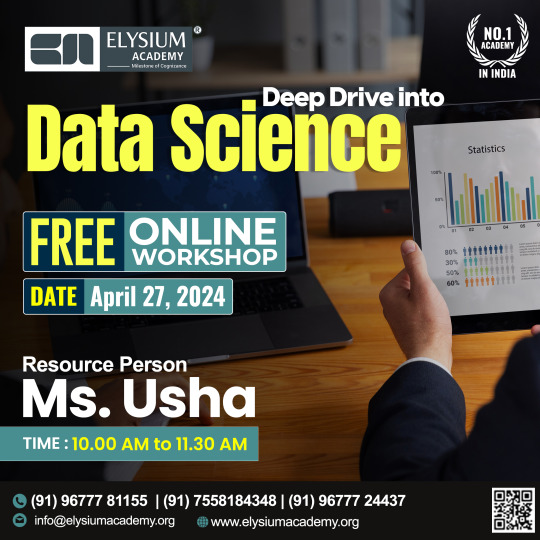
🚀 Deep Dive into Data Science Free Online Workshop 🚀
Unlock the power of data science in our free online workshop! Join us for an immersive journey into the world of data analysis, machine learning, and more.
🗓️ Date: April 27, 2024
🕙 Time: 10:00 AM to 11:30 AM (GMT)
🎙️ Resource Person: Ms. Usha
🌟 Data Science Expert
🌟 Passionate about sharing insights and fostering learning
✨ Reserve your spot now and embark on a path to unlock the potential of data-driven insights! ✨
Don't miss this opportunity to dive deep into data science and elevate your skills to the next level. ✨
Join us on April 27th for an empowering journey of data analysis and machine learning. 🎉
#Elysiumacademy#Freeworkshop#Freeonlineworkshop#Freeonlineworkshopindatascience#DataScienceWorkshop#LearnDataScience#DataAnalysis#MachineLearning#FreeWorkshop#OnlineLearning#TechEducation#DataScienceTraining#CodingWorkshop#DataScienceCommunity#TechWorkshop#DataSkills#DataDriven#AnalyticsWorkshop#python#Datawithpython#datascience#datascienceprinciples
0 notes
Text
Best Data Science Course in Dehradun
Looking to embark on a rewarding journey in the world of data science? You don't need to look anywhere else than Dehradun. There are many options here that are perfect for what you're looking for.Whether you prefer the flexibility of online learning or the immersive experience of offline classes, Dehradun offers best data science course in dehradun to suit every preference. From comprehensive Data Science Masters programs to specialized certifications, there's something for everyone eager to delve into this dynamic field. With a blend of theoretical knowledge and hands-on training, these courses ensure you're equipped with the skills demanded by the industry. Whether you're a beginner or seeking to advance your career, the best data science courses in Dehradun provide the perfect platform to excel. Explore data science training in Dehradun today and unlock boundless opportunities in this thriving domain.
#datasciencecourse
#datascience #datasciencetraining

1 note
·
View note
Text
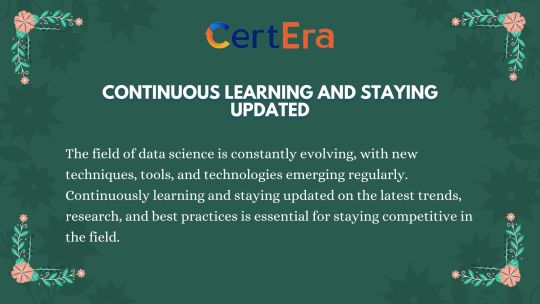
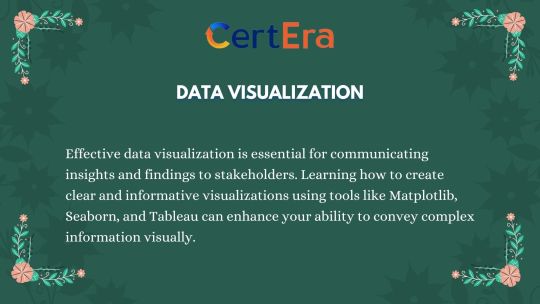
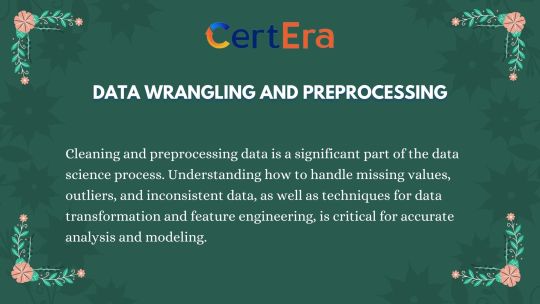

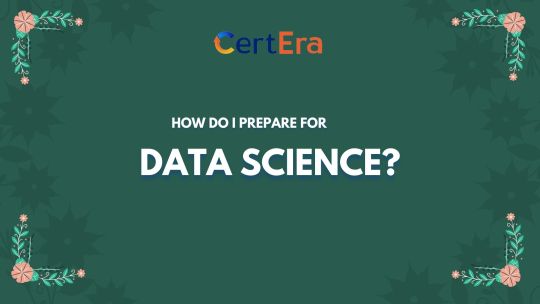
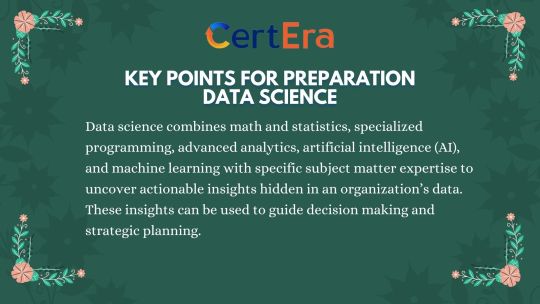
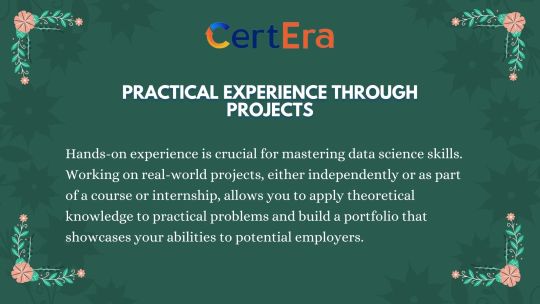
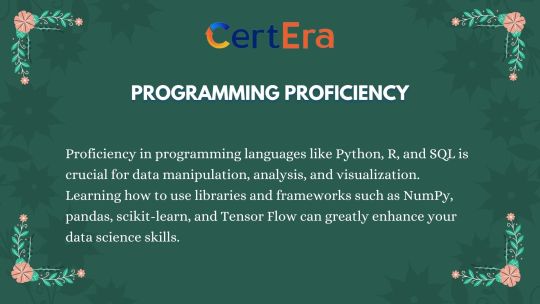
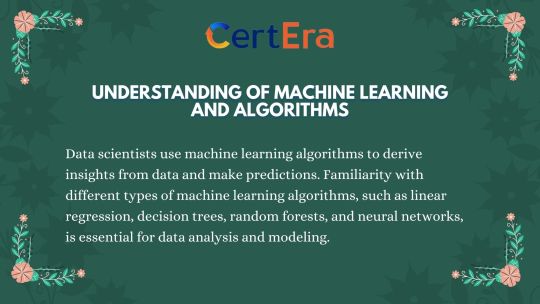
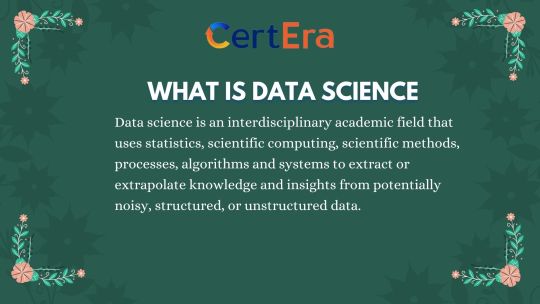
Learn about the architectures, best practices, and design concepts of AWS services. cloud computing know-how for robust and scalable solutions. #AWSExpert #CloudProfessional
For more information visit www.certera.co
#DataSciencePreparation#DataScienceSkills#DataScienceLearning#DataScienceTraining#DataScienceJourney#DataScienceTips#DataScienceResources#DataScienceEducation#DataScienceCareer#DataSciencePathway#DataScienceGoals#DataScienceStudy#DataScienceCurriculum#DataScienceDevelopment#DataSciencePrep
0 notes
Text
Edvancer Reviews – Career Tracks, Courses, Learning Mode, Fee, Reviews, Effective Ratings and Feedback

Edvancer, a leading provider of data science, machine learning, and artificial intelligence training courses, offers a comprehensive solution to companies aiming to equip their teams with skilled workers, enhance productivity, and reduce training costs. With a presence in Mumbai, Hyderabad, Bangalore, Delhi, Gurgaon, Noida, Pune, Chennai, and other locations, Edvancer ensures accessibility and convenience for learners.
Their courses are curated by seasoned professionals with extensive experience in the field, ensuring that learners gain relevant skills valued by industries. The courses are available online, allowing students to study at their own pace and convenience.
Founded in 2013 by Mr. Aatash Shah and Mr. Lalit Sachan, both alumni of prestigious institutions like IIM and IIT, Edvancer was acquired by GUS Global Services Pvt. Ltd. in 2021. Now part of Global University Systems (GUS), Edvancer aims to revolutionize education by offering career-focused learning opportunities that address the evolving needs of the industry.
Edvancer's offerings include courses in Data Science, Advanced Excel, Digital Marketing, and Business Analytics. These courses are designed to provide students with the highest quality education and training, supported by affiliations with premier education institutions. The certificates obtained from Edvancer are recognized by industry leaders, enhancing students' credibility and career prospects.
Key features of Edvancer's courses include high technical quality, personalized education tailored to students' needs, and a practical, exercise-oriented approach that prepares students for real-world challenges. The platform's user-friendly website design, detailed course information, and professional content contribute to a satisfying user experience.
Edvancer offers various courses, including Data Analytics, Artificial Intelligence, Certified Business Analysis Professional, and more. These courses cover a wide range of topics, from fundamental concepts to advanced techniques, ensuring comprehensive learning.
The Edvancer Data Science Course, for example, equips learners with essential skills in predictive analytics and machine learning, paving the way for a career as a full-stack data scientist. The course offers certification with complete placement support and practical, hands-on learning experiences.
The syllabus of the Edvancer Data Science Course includes modules on Business Analytics in R, Machine Learning in Python, and Data Analysis in SQL, among others. Learners also work on real-world projects from various industries, building a portfolio to showcase their skills to potential employers.
Edvancer's faculty, including individuals like Lalit Sachan, bring extensive expertise and industry experience to the table. Their commitment to delivering high-quality education and personalized support ensures a rewarding learning experience for students.
Edvancer's courses have garnered positive reviews, with students praising the support of expert teachers, high technical quality, and practical learning experiences. While some courses may have longer durations or higher costs, the platform's commitment to excellence and career-focused education makes it a valuable investment for individuals looking to upskill in the field of data science and related disciplines.
In conclusion, Edvancer stands out as a leading provider of data science and analytics education, offering comprehensive courses, expert instructors, and career support services to empower learners for success in the rapidly evolving digital landscape.
#Edvancer#DataScienceTraining#ArtificialIntelligenceCourses#CareerDevelopment#OnlineLearning#ProfessionalEducation
0 notes
Text
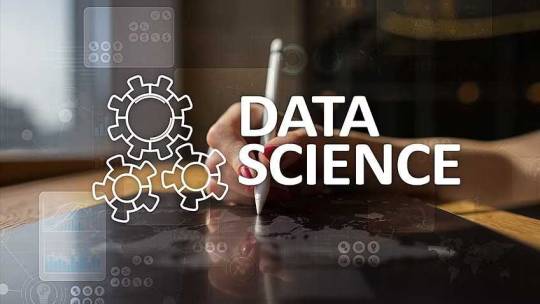
At APTRON Solutions, we understand the importance of practical, hands-on learning. That's why our Data Science Training Course in Noida is designed to provide you with real-world experience through immersive projects, case studies, and industry-relevant curriculum. Whether you're a beginner or seasoned professional looking to upskill, our course caters to all proficiency levels.
#DataScience#DataScienceTraining#Noida#APTRONSolutions#Python#MachineLearning#DeepLearning#BigData#DataAnalytics#DataVisualization#CareerDevelopment
0 notes
Text
Top Azure Data Factory Training In Hyderabad #1 Institute - NareshiT
Naresh i Technologies
✍Enroll Now: https://bit.ly/3QhLDqQ
👉Attend a Free Demo On Azure Data Engineering with Data Factory by Mr. Gareth.
📅Demo on: 1st May @ 9:00 PM (IST)

An Azure Data Engineer is a professional responsible for Designing, Implementing, and maintaining Data Solutions on the Microsoft Azure Cloud Platform. They work with various Azure Services and tools to build Robust Data Pipelines, manage Data Storage and processing, perform Data Integration and Transformation, and ensure Data Security, Integrity, and Compliance. Azure Data Engineers are skilled in working with Technologies such as Azure Data Factory, Azure Databricks, Azure Synapse Analytics, Azure Stream Analytics, and other related services to enable organizations to efficiently manage and derive insights from their data assets. They play a crucial role in enabling data-driven decision-making and driving business outcomes through actionable insights.
#Microsoftazure#azuredataengineer#microsoft#azure#azureadmin#Online#training#Course#education#learning#software#students#dataengineering#datascience#machinelearning#dataengineer#dataanalytics#bigdataanalytics#dataanalysis#datasciencetraining#nareshit
0 notes
Text

Exploring the Dynamic Landscape of Data Analyst Roles From Data Scientists to Business Analysts, uncover the diverse skill sets driving innovation and shaping the future of data-driven industries.
𝐇𝐞𝐫𝐞 𝐚𝐫𝐞 𝐭𝐡𝐞 𝐝𝐢𝐟𝐟𝐞𝐫𝐞𝐧𝐭 𝐫𝐨𝐥𝐞𝐬 𝐨𝐟 𝐚 𝐃𝐚𝐭𝐚 𝐀𝐧𝐚𝐥𝐲𝐬𝐭 𝐝𝐞𝐟𝐢𝐧𝐞𝐝 𝐢𝐧 𝐩𝐨𝐢𝐧𝐭𝐬:
* 𝐑𝐢𝐬𝐤 𝐚𝐧𝐚𝐥𝐲𝐬𝐭
* 𝐃𝐚𝐭𝐚 𝐚𝐧𝐚𝐥𝐲𝐬𝐭
* 𝐅𝐢𝐧𝐚𝐧𝐜𝐢𝐚𝐥 𝐚𝐧𝐚𝐥𝐲𝐬𝐭
* 𝐒𝐐𝐋 𝐝𝐞𝐯𝐞𝐥𝐨𝐩𝐞𝐫
* 𝐁𝐮𝐬𝐢𝐧𝐞𝐬𝐬 𝐚𝐧𝐚𝐥𝐲𝐬𝐭
* 𝐁𝐥 𝐝𝐞𝐯𝐞𝐥𝐨𝐩𝐞𝐫
* 𝐎𝐩𝐞𝐫𝐚𝐭𝐢𝐨𝐧 𝐚𝐧𝐚𝐥𝐲𝐬𝐭
* 𝐏𝐫𝐨𝐝𝐮𝐜𝐭 𝐚𝐧𝐚𝐥𝐲𝐬𝐭
Stay tuned for the next post!
know more: https://www.analyticsshiksha.com
#super30#artofproblemsolving#analyticsshiksha#checkyoureligibilty#super30dataanalyticsprogram#datascience#dataanalytics#datasciencecourse#dataanalyticscourse#financeanalyst#sqldeveloper#businessanalysts#bideveloper#DataVisualization#operationanalyst#productanalyst#datasciencetraining#programming#codinglife#pythonprogramming#data#ai#bigdataanalytics#statisticsclass#businessanalysis#chatgptprompts#careerchange#careergrowth#careerjourney
1 note
·
View note
Text
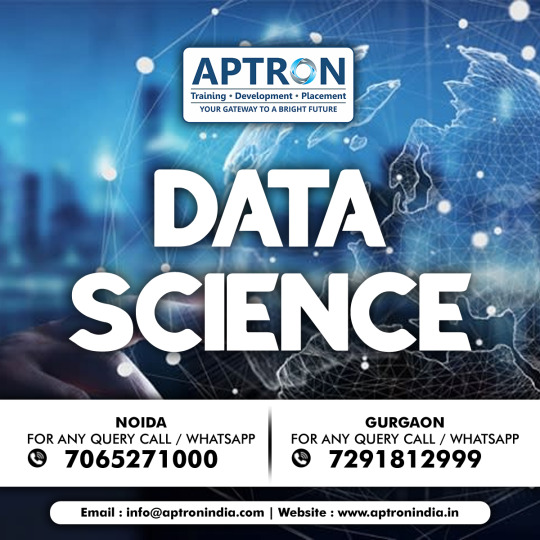
Are you eager to dive into the dynamic realm of data science? Look no further than APTRON Gurgaon's comprehensive Data Science Training Course in Gurgaon. Nestled in the heart of Gurgaon, our program is meticulously crafted to equip aspiring data enthusiasts with the skills and expertise demanded by today's competitive industry landscape. Our seasoned instructors bring years of industry experience to the classroom, ensuring you receive top-notch training tailored to real-world scenarios. From fundamental concepts to advanced techniques, they'll guide you every step of the way.
#DataScienceTraining#APTRONGurgaon#DataScienceCourse#LearnDataScience#GurgaonTraining#DataScienceSkills#DataAnalytics#CareerInDataScience#AIandMLTraining#TechEducation
0 notes
Text
Distinguishing Between Data Science and Computer Science
In today's digital age, the fields of Data Science and Computer Science stand as pillars of technological innovation and advancement. While they share some similarities, they are distinct disciplines with unique focuses and applications. Understanding the disparities between Data Science and Computer Science is crucial, especially for individuals considering a career path or contemplating which field of study to pursue. This blog post aims to shed light on the key differences between Data Science and Computer Science, exploring their respective domains, methodologies, and career opportunities.
Definition and Scope:
Data Science Course encompasses the study of extracting insights and knowledge from data. It involves various processes such as data collection, cleaning, analysis, and interpretation to uncover valuable patterns and trends. On the other hand, Computer Science deals with the theory, design, development, and application of software and computational systems. While Data Science focuses on utilizing data to make informed decisions, Computer Science emphasizes the creation and optimization of algorithms and software solutions.
Focus and Objectives:
A Data Science Training Course primarily focuses on leveraging data to solve complex problems and make predictions or recommendations. It involves applying statistical techniques, machine learning algorithms, and data visualization methods to extract meaningful information from large datasets. In contrast, Computer Science aims to develop efficient algorithms, software systems, and computing technologies. It covers a wide range of topics such as programming languages, data structures, algorithms, databases, and network systems.
Methodologies and Techniques:
Data Science employs a variety of methodologies and techniques, including statistical analysis, machine learning, data mining, and predictive modeling. Professionals in this field use programming languages like Python, R, and SQL, along with specialized tools and frameworks such as TensorFlow and scikit-learn. Computer Science, on the other hand, emphasizes algorithmic problem-solving, software engineering principles, and computational thinking. Programmers often utilize languages like Java, C++, or JavaScript to develop software applications and systems.
Applications and Industries:
Data Science finds applications across diverse industries, including finance, healthcare, e-commerce, marketing, and telecommunications. Professionals in this field work on projects such as predictive analytics, recommendation systems, fraud detection, and personalized marketing campaigns. A Data Science Course Training equips individuals with the skills needed to extract actionable insights from data and drive strategic decision-making in various domains. In contrast, Computer Science graduates are in demand across industries such as software development, cybersecurity, artificial intelligence, robotics, and computer networking. They play key roles in designing and implementing software solutions, optimizing system performance, and ensuring the security of digital assets.
Career Opportunities and Growth:
Pursuing a Data Science Training opens up a wide range of career opportunities, including data scientist, data analyst, machine learning engineer, business intelligence analyst, and data engineer. The demand for data professionals continues to rise as organizations recognize the importance of data-driven decision-making in gaining a competitive edge. On the other hand, Computer Science graduates can pursue careers as software developers, software engineers, systems analysts, cybersecurity specialists, and network administrators. With the rapid advancements in technology, the job market for computer science professionals remains robust, offering opportunities for growth and innovation.
Summary
In conclusion, Data Science and Computer Science are distinct yet interconnected fields that play critical roles in shaping the future of technology and innovation. While Data Science focuses on extracting insights from data to drive decision-making, Computer Science revolves around the design and development of software systems and computational solutions. By understanding the key differences between these disciplines, individuals can make informed decisions about their educational and career paths. Whether pursuing a Data Science Institute or a degree in Computer Science, both fields offer exciting opportunities for growth, exploration, and impact in the digital age.
0 notes
Text

Embark on a data Science journey with eMexo Technologies! 🚀 Uncover the power of data science at the best training institute in Electronic City, Bangalore. 🔍 Elevate your skills and shape the future of technology. 💡 Join us for a transformative Data Science Course! 📊
🔗https://www.emexotechnologies.com/courses/data-science-with-python-certification-training-course/
Reach us:👇
📞 +91 9513216462
🌐https://www.emexotechnologies.com
🌟 Why Choose eMexo Technologies?
Expert Trainers
Hands-on Learning
Industry-Relevant Curriculum
State-of-the-Art Infrastructure
🔥 Data Science Course Highlights:
Comprehensive Syllabus
Real-world Projects
Interactive Sessions
Placement Assistance
🏆 Best Data Science Training Institute in Electronic City, Bangalore!
Our commitment to excellence makes us the preferred choice for Data Science enthusiasts. Get ready to embrace a learning experience like never before.
📆 Enroll Now! Classes are filling up fast!
📌 Location: #219, First Floor, Nagalaya, 3rd Cross Road, Neeladri Nagar, Electronics City Phase 1, Electronic City, Bengaluru, Karnataka 560100
#datasciencewithpython datasciencewithpythontraininginstituteinelectroniccity emexotechnologies datasciencewithpythononline datasciencewithpy#datasciencetraininginbangalore#datasciencetraining#datascience#datasciencewithpython#emexotechnologies#electroniccity#bangalore#course#traininginstitute#education#training#learning#careers#jobs#studyblr
0 notes